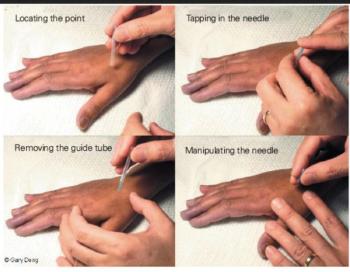
Oncology nursing leader Deborah Boyle highlights some essential tips to address common issues in bedside care, staff communication, and on-the-job distress.

Your AI-Trained Oncology Knowledge Connection!


Oncology nursing leader Deborah Boyle highlights some essential tips to address common issues in bedside care, staff communication, and on-the-job distress.

DNA and RNA sequencing results suggest prostate cancer treatment “involving inhibition of CDK12 and immune checkpoint blockade,” a U Michigan team said.

This study is the first to show significantly improved OS from single-agent treatment in this particularly difficult to treat population.

For each 25 nmol/L increment of circulating vitamin D, colorectal cancer risk was 19% lower in women and 7% lower in men.

Following diagnosis, only one-third of black women in this retrospective study were referred to genetic counselors-and none actually received counseling.

In the Utah Cancer Survivors Study, male thyroid cancer survivors had an almost 50% higher risk of developing cardiovascular disease than females.

The study is potentially a “leap forward” in cancer genomics, particularly for subsets of patients with metastatic and anaplastic thyroid cancer.

The trastuzumab biosimilar ABP 980 showed noninferiority to trastuzumab in a large trial of patients with early HER2-positive breast cancer.

This article reviews how acupuncture is thought to work, data on acupuncture for managing pain caused by cancer or by cancer treatment, how acupuncture is practiced in the US medical system, discussion of safety issues, and practical tips on how to integrate acupuncture into cancer care.

In this Q&A, we discuss cancer care trends and how the management of cancer is changing as patients live longer.

Late last year, ONCOLOGY hosted a writing contest on Cancer Network, in which we asked our readers to share their personal experiences with delivering bad news. Dr. Trevor Bayliss submitted a piece about his experience as a young patient, and how that influenced his decision to become an oncologist.

In AFT-30, increased frequency of PSA screening for localized prostate cancer did not boost survival, regardless of primary treatment or disease risk.

A simple blood draw to evaluate cfDNA might one day be used for early-stage lung cancer screening-if the mutational “noise” of normal aging can be addressed.

Alisa Domb highlighted training and workflow optimization for an ambulatory-setting navigation program covering 10 hem/onc clinics and 2 cancer centers, during the 2018 ONS Congress.

Jeannine Brant, PhD, APRN-CNS, discussed the importance of using non-opioid modalities to manage cancer patients' pain, during the 2018 ONS Congress.

Updates to the 8th edition of AJCC's staging manual include incorporation of more nonanatomic features. Oncology Clinical Specialist Chelsea Backler discussed key changes during the 2018 ONS Congress.

Cancer patients get inundated with advice, but how much of it can be trusted? Patient advocate Suzie Siegel weighs in.

A study led by Dr. Jun Mao of MSKCC found CBT and acupuncture each yielded clinically meaningful and durable sleep-related QOL improvements.

Detailed education and other initiatives related to CHG cloth use boosted bathing compliance rates by 95% in 14 months, and decreased CLABSI by 8%.

After non-oncology units received comprehensive safety kits for handling oral hazardous drugs, chemo handling precautions at Maine Medical Center increased significantly.

Recurrence risk was greater in sarcopenic patients, and greater alpha-fetoprotein and microvascular invasion were independent risk factors.

A retrospective study of ICIs by French investigators found manageable toxicity in patients over age 70, and survival outcomes comparable to younger patients.

A Cleveland Clinic team found patients with false-positive results subsequently become more involved in cancer screening programs.

A doctor sits down with Cancer to gauge its feelings towards new immunotherapy agents, lower smoking rates, and the US obesity epidemic.

In the US, cancer treatment is more expensive for patients younger than 65, according to a Kaiser Permanente study.

Patients with alcohol-related HCC had worse OS than other HCC patients, mainly due to poorer liver function and more unfavorable tumor characteristics at diagnosis.

In this podcast, Dr. Debra Patt discusses trends in cancer care, including how treatments are becoming more personalized and less toxic.

Stage III colon cancer patients adhering to ACS Nutrition and Physical Activity Guidelines for Cancer Survivors after diagnosis had a 42% lower risk of death.

A large prospective analysis of data from the UK Women’s Cohort Study found an association between red meat consumption and distal colon disease risk.

A USCF team has uncovered molecular insights into meningioma biology that could lead to new, less toxic treatment approaches.